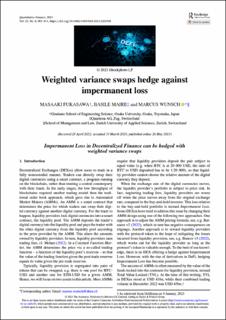Please use this identifier to cite or link to this item:
https://doi.org/10.21256/zhaw-29268| Publication type: | Article in scientific journal |
| Type of review: | Peer review (publication) |
| Title: | Weighted variance swaps hedge against impermanent loss |
| Authors: | Fukasawa, Masaaki Maire, Basile Wunsch, Marcus |
| et. al: | No |
| DOI: | 10.1080/14697688.2023.2202708 10.21256/zhaw-29268 |
| Published in: | Quantitative Finance |
| Volume(Issue): | 23 |
| Issue: | 6 |
| Page(s): | 901 |
| Pages to: | 911 |
| Issue Date: | May-2023 |
| Publisher / Ed. Institution: | Routledge |
| ISSN: | 1469-7688 1469-7696 |
| Language: | English |
| Subjects: | Decentralized exchange; Digital currency; Impairment loss; Weighted variance swap |
| Subject (DDC): | 332.6: Investment |
| Abstract: | Decentralized Exchanges (DEXes) allow users to trade in a fully noncustodial manner. Traders can directly swap their digital currencies using a smart contract, a program running on the blockchain, rather than trusting a central counterparty with their funds. In the early stages, the low throughput of blockchains required another trading model than the traditional order book approach, which gave rise to Automated Market Makers (AMMs). An AMM is a smart contract that determines the price for which traders can swap their digital currency against another digital currency. For the trade to happen, liquidity providers lock digital currencies into a smart contract, the liquidity pool. The AMM deposits the trader's digital currency into the liquidity pool and pays the trader with the other digital currency from the liquidity pool according to the price provided by the AMM. This alters the amounts owned by liquidity providers. In turn, liquidity providers earn trading fees, cf. Mohan (Citation2022). In a Constant Function Market, the AMM determines the price via a so-called trading function – a function of the liquidity pool's reserves – so that the value of the trading function given the post-trade reserves equals its value given the pre-trade reserves. |
| URI: | https://digitalcollection.zhaw.ch/handle/11475/29268 |
| Fulltext version: | Published version |
| License (according to publishing contract): | CC BY-NC-ND 4.0: Attribution - Non commercial - No derivatives 4.0 International |
| Departement: | School of Management and Law |
| Organisational Unit: | Institute of Wealth & Asset Management (IWA) |
| Appears in collections: | Publikationen School of Management and Law |
Files in This Item:
| File | Description | Size | Format | |
|---|---|---|---|---|
| 2023_Fukasawa-etal_Weighted-variance-swaps_QuantitativeFinance.pdf | 4.37 MB | Adobe PDF |  View/Open |
Show full item record
Fukasawa, M., Maire, B., & Wunsch, M. (2023). Weighted variance swaps hedge against impermanent loss. Quantitative Finance, 23(6), 901–911. https://doi.org/10.1080/14697688.2023.2202708
Fukasawa, M., Maire, B. and Wunsch, M. (2023) ‘Weighted variance swaps hedge against impermanent loss’, Quantitative Finance, 23(6), pp. 901–911. Available at: https://doi.org/10.1080/14697688.2023.2202708.
M. Fukasawa, B. Maire, and M. Wunsch, “Weighted variance swaps hedge against impermanent loss,” Quantitative Finance, vol. 23, no. 6, pp. 901–911, May 2023, doi: 10.1080/14697688.2023.2202708.
FUKASAWA, Masaaki, Basile MAIRE und Marcus WUNSCH, 2023. Weighted variance swaps hedge against impermanent loss. Quantitative Finance. Mai 2023. Bd. 23, Nr. 6, S. 901–911. DOI 10.1080/14697688.2023.2202708
Fukasawa, Masaaki, Basile Maire, and Marcus Wunsch. 2023. “Weighted Variance Swaps Hedge against Impermanent Loss.” Quantitative Finance 23 (6): 901–11. https://doi.org/10.1080/14697688.2023.2202708.
Fukasawa, Masaaki, et al. “Weighted Variance Swaps Hedge against Impermanent Loss.” Quantitative Finance, vol. 23, no. 6, May 2023, pp. 901–11, https://doi.org/10.1080/14697688.2023.2202708.
Items in DSpace are protected by copyright, with all rights reserved, unless otherwise indicated.